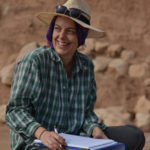iTunes | Google Play | RSS (Soundcloud) | Stitcher
Welcome to the Ada Lovelace Day podcast, highlighting the work of women in STEM. Each month, we talk to women from around the STEM world about their careers, as well as talking to women and men, about historic and modern women’s achievements, discoveries, and inventions.
In this episode
01:23 Psychological scientist Dr Julia Shaw explains why we shouldn’t trust our own memories, and how knowing that can help us develop a better relationship with our past.
28:16 Bio-archeologist Dr Brenna Hassett explores the lives and works of three pioneering archaeologists who have been instrumental in developing our understanding of prehistoric Turkey, Halet Çambel, Ufuk Esin, and Mihriban Özbaşaran.
Our interviewees
Dr Julia Shaw
 Dr Julia Shaw is a memory scientist in the Department of Law and Social Sciences at London South Bank University. She is the author of the popular science book The Memory Illusion, which was published in June 2016, in the UK and will soon appear in 13 languages. She is a regular contributor to Scientific American, and her work has been featured in outlets such as the Discovery Channel, BBC, Der Spiegel, Russia Today and The Times.
Dr Julia Shaw is a memory scientist in the Department of Law and Social Sciences at London South Bank University. She is the author of the popular science book The Memory Illusion, which was published in June 2016, in the UK and will soon appear in 13 languages. She is a regular contributor to Scientific American, and her work has been featured in outlets such as the Discovery Channel, BBC, Der Spiegel, Russia Today and The Times.
Besides her teaching and research, she has delivered general business and police training workshops, has given guest lectures at universities around the world, has evaluated offender diversion programs, and works with the UK police to advise on historical sexual and physical abuse cases.
Julia has also written about women in STEM for the Scientific American, in Swapping Princesses and Ponies for Science. You can follow Julia on Twitter at @DrJuliaShaw, and watch her video on memory below or on YouTube. Photo: Boris Breuer
Dr Brenna Hassett
 Dr Brenna Hassett is a bioarchaeologist specialising in the archaeology of teeth. Her research examines evidence from growth disruptions locked inside dental enamel to understand patterns of human health in the past, and she has worked in a variety of countries including Egypt, Greece, Turkey, and Thailand.
Dr Brenna Hassett is a bioarchaeologist specialising in the archaeology of teeth. Her research examines evidence from growth disruptions locked inside dental enamel to understand patterns of human health in the past, and she has worked in a variety of countries including Egypt, Greece, Turkey, and Thailand.
She is a founding member of the TrowelBlazers collective, which seeks to reset imaginations by bringing the contributions of women to the Earth Sciences to light. Their new Raising Horizons project will promote the work of women in the trowel-based sciences via a photographic and oral history archive (video below).
Her new book Built on Bones: 15,000 Years of Urban Life and Death is out from Bloomsbury Sigma in the UK in February 2017, and in North American April 2017. You can follow Brenna on Twitter at @brennawalks.
Thanks to our sponsor
This podcast is brought to you thanks to the generous support of ARM, our exclusive semiconductor industry sponsor. You can learn more about ARM on their website at ARM.com and you can follow them on Twitter at @ARMHoldings.
If you would like to join ARM as a sponsor of the Ada Lovelace Day Podcast, please email us.
Get in touch!
If you’d like to send us feedback about the show, or if you’d like to take part, please email us. We’re especially interested in hear from men who would like to talk to us about the women in STEM who have influenced them, especially those women who are less well known.
Credits
Episode edited by Andrew Marks.